Last Update: 2024 - 05 - 21
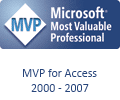
Access DevCon - Access Developer Conference - April 2017, Vienna
by Philipp Stiefel, originally published March 30th, 2017
last updated May 2nd, 2017

On the first weekend of April 2017 the very first Access DevCon international Access Developers conference took place in Vienna, Austria. This page will contains my personal impressions from the conference and some related information.
Prelude to the conference
Preparation / Packing for Vienna
I usually travel light. Very light. A medium sized backpack is usually enough to contain the stuff I need for an extended weekend or maybe even a whole week. That being said, this picture might come as a bit of a surprise.
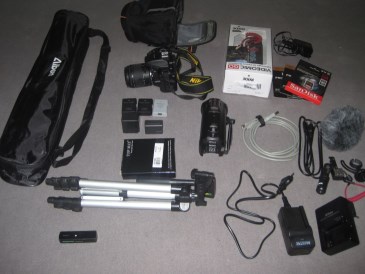
Although I was mentally prepared for it, it still came as a bit of a shock to me. - And, obviously, personal stuff like clothes and toiletries were extra.
So I hauled quite a bit of stuff to Vienna. The obvious question is: “Why?” - Of course I had some things planned...
Vienna on Thursday night
I arrived late on Thursday in Vienna and checked in to a hotel near the Westbahnhof of Vienna because the conference hotel had no more rooms available for hat night. Luckily the weather was very mild and warm that night. So I used the remains of that evening to explore that area of Vienna by foot and check out some of the local bars. One noteworthy place was Timo’s Living Room, where they specialized in beer cocktails. - Scotty, beer me up!
My first impression of Vienna was very positive and enjoyable.
Friday and the guided tour
On Friday morning I did some scouting of the vicinity of the hotel to find locations for my planned interviews with some of the speakers of the conference.

Later on I went a bit further afield to explorer this part of the city and to record an episode of Better VBA in Vienna. I choose to record in a public park, which proved to be not the best of choices because the video footage came out a bit weird due to strong contrast of light and shadow.
Then I had to hurry back to the hotel to take part in the guided tour of Vienna for the attendees of the conference. Unfortunately I failed to understand how Vienna’s public transport route numbering worked and boarded the wrong tram. Hence I did not make it in time to the meeting point, but luckily just caught the group when they were leaving the hotel.
Our guide was Karl Donaubauer, organizer of the Access DevCon, himself. While historic buildings are not necessarily my favorite, Karl’s insightful stories and explanations made the tour quite worth my while. One story, rather on the creepy side, was that about the Austrian custom to remove the hearts and organs from the bodies of the deceased Austrian emperors and to bury them in different locations in the city of Vienna. - All of those locations were part of the tour, of course.
After we returned to the hotel, I had the great pleasure of doing a video interview with Luke Chung of FMS.
Access DevCon, Saturday, April 1st 2017

Usually I’m among the people entering the conference room last. It was quite the opposite this time. I was actually the first one there to set up my video equipment for recording the conference presentations.
Michal Bar and Mike Sullivan (Microsoft) - Access Team
This is the very first Access conference on mainland Europe where someone from the Microsoft Access Team showed up. - That alone is a noteworthy fact.
After the rather disappointing Access 2016 release, not containing any significant enhancements, this is quite a strong signal that the Access Team changed after the 2016 release and Microsoft and the mostly new team still does care about Access.
Michal started the presentation by acknowledging, slightly nervous, the end of Access Services in SharePoint and with it Access Web Apps. Both are going to be retired from Office 365 in 2018. - Fortunately, nobody in the audience seemed particularly bothered by this news.
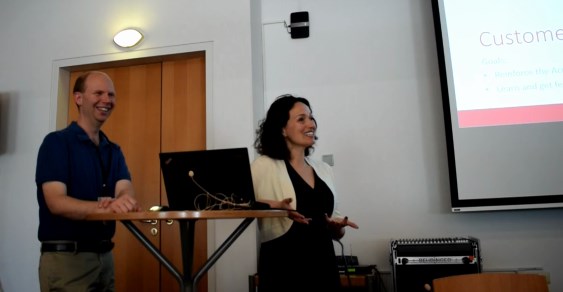
Then much more positive Access-News of the last months were reiterated. There are new features incrementally added to Access 2016. And, compared to the initial release, some of them quite significant. Reactivated dBase support, sortable property sheets, handling of lost ODBC-Connections, and support for large numbers with the new BigInt (Int64) data type were the main new features discussed.
The new BigInt data type was then being presented by Mike in a live demo. This was a small and simple demo, but still nice to see this feature work in a real database. This might seem to be a small new feature, but it certainly has a big, positive impact on the work of many developers working with server based backend databases.
After the demo some glimpses of future enhancements were revealed; namely the new data connectors for OData and Salesforce built into Access. The information was somewhat vague, but still interesting.
The final part of their presentation was focused on how important feedback is to the current Access Team, and how to provide feedback to Microsoft. The most accessible channel is the Access Suggestion Box on Uservoice.
Thank you both for being in Vienna, thank you for listening! Hope to see you again soon.
Thomas Pfoch - Access Flows / Access Tree View
An Access Application running on a tablet computer? Really? Yes, really! If you were just looking at the screen you probably would not have believed that. Amazing. That is something I haven’t seen before (I did not attend AEK 17, where Thomas previously showed a demo of this application.
This was quite an interesting demo, as it impressively demonstrated that Access is not as completely locked in to the desktop environment as it usually is seen.
But Thomas was not content to show just one amazing Access Application. The second part of his presentation was about the impressive TreeView-Control he created with just the built-in functionality of Access.
A tree view control is a very useful control to display hierarchical data. But Microsoft broke binary compatibility of its own tree view control several times in the past and it is not available as a 64-bit-version. So Thomas approach to create a replacement control using only native Access controls makes perfect sense.
Thomas showed several compelling demo applications using his tree view. Like a Windows Explorer style application, which was able to display the file system structure as well as the contents, data and structure, of Access databases. And, as a nice visual effect, the demo application could use any Explorer icon set of all the recent Windows versions.
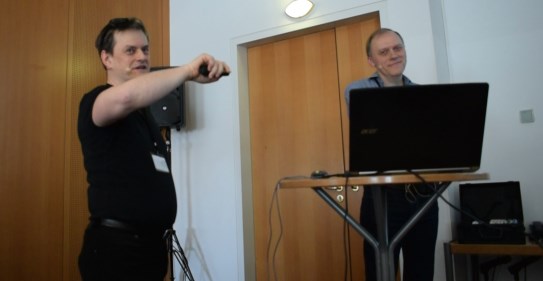
The whole presentation was a very interesting display of what is possible in regards to user interface design with Microsoft Access. The applications Thomas presented did not look at all like the usual Access database applications. This on its own was a quite valuable demonstration.
Thomas presentation style was calm and collected and very well balanced between showing all the technical implementation aspects to the audience and showcasing the resulting user interface for the end users. Karl acted as a co-speaker from the sidelines in this presentation. This was actually quite a good idea, as the dialogue between the two speakers added an interesting twist to the presentation.
Well done.
Luke Chung - Access Strategies
There aren’t many people in the tech industry with in-depth knowledge of their field and the talent to entertain an audience all the way through a 90-minute presentation. – Luke, Founder and President of FMS, certainly is one of those rare unicorns of the tech industry. - And he did an excellent job with this talk.
Luke began his presentation with an overview over the Access developer tools he and his company FMS built. There are several products in their portfolio that could help every Access developer. So even though this was mainly a product promotion, this was very valuable information.
Then he started with the main content of his presentation with an overview over the history of Access and the general IT landscape surrounding it. This set the stage for the rest of his talk, where he very plausibly illustrated the significant benefits of Access compared to other database solutions.
He emphasized the advantages of Access, like RAD, reports, sub-forms, and the supreme ease of creating windows desktop data entry applications. Another key point being the return of investment (ROI) for Access Applications being excellent compared to more sophisticated database solutions.
He also debunked many problems with Access Applications, commonly perceived by IT departments, as myths, resulting from Access databases of varying quality dropped at the ITs doorstep without any advance warning.
I guess most professional Access developers in the audience already intuitively knew most of the points he presented. But his concise presentation of these facts, supported by numbers, charts, and his vast experience with Access in the corporate environment delivered invaluable basis for discussion with corporate clients.
For me this was one of the most valuable talks I attended in a very long time. Luke’s military analogy “If you have got a tank that’s no reason to deny your soldiers bullets.” will become part of my arsenal to defend Access against mindless prohibition by corporate IT.
Juan Soto - Access + SQL Server online
Juan started his presentation by announcing some news about Access, which even the Access Team did not knew. Like the upcoming introduction of MaybeSQL in a future version of Access. - You did pay attention to the talks date didn’t you?
Then, by emphasizing the benefits of an Access application running locally instead of on a remote terminal server, namely access to the local files system, sending emails with the local email client, and using local tools like Excel for further data analysis, he illustrated the use case for an Access Application connected to an Azure-SQL-Backend.
He made clear, that any developer planning to utilize these possibilities, needs to become familiar with the TSQL-Programming-Language and SQL Server Management Studio (SSMS). Juan particularly showed SSMS very extensively to write queries, optimize indexes and manage your SQL-Server-Database on Azure. But he also pointed out, that it is vital to fix any problems in your existing, plain Access-DB before moving its backend to the cloud.
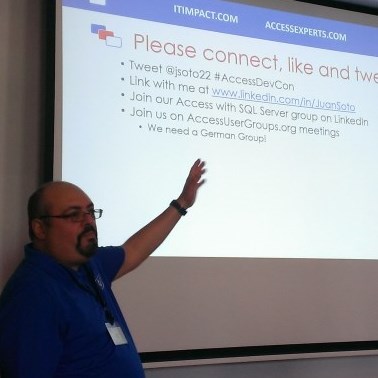
Most of his advice was useful to improve the performance of any Access application with SQL-Server-Backend. However, the most value was in his tips particularly directed to databases hosted in the cloud on SQL-Azure, like the discussion of encryption, security, and authorization measures.
Many useful topics and tips and hints were presented in this talk in a very captivating and entertaining way. Still, I personally found some of the topics he covered were lacking technical depth and some of the digressions were too vague. - Keep in mind that I say this from a perspective of someone working with Access and SQL-Server-Backends for a very long time already.
Kevin Bell - Tools to Extend Access Development
Kevin is a former team member of the Access Team at Microsoft and now working for the sports card trading company COMC. His presentation was actually a two in one deal. He took on two very different, but equally important, topics for professional Access developers.
Git and OASIS-SVN
The first presentation is about his experiences with Git and OASIS-SVN for version control in professional Access projects. He introduced the topic of the first presentation with the statement: Everybody here should be using source code control in some way, shape, or form. (I second this opinion!).
Source code control should be a familiar concept for experienced developers, so Kevin made the right choice not to dwell too much on basics, but to focus on the more advanced topics. Namely, setting up Git on Visual Studio Team Services and merging conflicting changes in a multi-developer scenario.
Kevin’s presentation was completely based on his own day-to-day experience in Access development with the tools he presented. That resulted in a very down to earth presentation, dealing with the fundamental issues that really matter in this context.
Asp.Net MVC
The second part, actually more of a totally different presentation after all, is about Access and the Holy Grail. - The Holy Grail being here bringing your database application to the web.
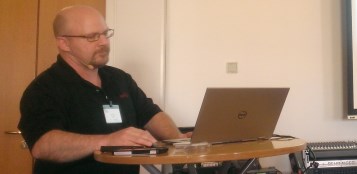
Days after Microsoft announced the demise of Access-Web-Apps, this topic became even more relevant than before. So, Asp.Net MVC is an option Access developers should be aware of. Kevin’s presentation once again focused not on the bells and whistles, but rather on the core process of getting a simple MVC-Application with SQL-Server up and running.
He covered little of the internal mechanisms of MVC and rather pointed out all the benefits for rapid application development for the web available in MVC. Particularly the easy data binding, data annotations and the clear structure of the MVC-Pattern. Sure, all this is a lot to take in if you never dealt with MVC before, but Kevin’s practice related approach to presenting made this a talk that everybody in the room should have been able to follow.
As I worked with MVC before, there was not much brand new information for me in there, but Kevin definitely succeeded with his stated goal of making me remembering some information I once knew and forgot.
A very relevant topic presented in a very concise and structured way. Thumbs up!
“Nu-Get” for Access
After his main presentation Kevin hosted an open discussion about building a package manager for Access, similar to the popular NuGet for the .Net Framework and Visual Studio in particular.
He presented his idea to create a platform to manage and distribute tools for Access development. This would include a server infrastructure to host all those developer tools in different versions and a local component, probably an add-in to Access, to manage the local installation of the tools and their potential dependencies.
The whole operation should be a community project with several developers contributing to it. He and his employer would support the project by providing the server infrastructure to host the server-side code and support the project by investing some time into development as well. That is a valuable offer for such a project. I hope there will be some developers interested enough, to help this take off.
Saturday evening dinner
On this evening Karl organized a common dinner for the attendees of the conference. As far as I could see, the majority of the conference attendees joined in and took part in this dinner. While the location did not provide the best of value for the money they demanded, the whole event was still a success in my perception. There were lively conversations at every table and most of the people of German language managed to restraint themselves from defaulting to German in the casual conversation (most of the time).

After dinner Ynte Jan Kuindersma, who is well acquainted with Vienna, took me and a couple of other guys to visit a Viennese coffee house. That was a graceful close to a busy and exciting day.
Access DevCon Sunday, April 2nd 2017
I was very early in the conference room again, but after getting at least a tiny bit of routine setting up the video equipment, I was less stressed by this fact than the day before.
Luke Chung - Access Challenges
Originally there was a presentation by Armen Stein planned instead of this one. But Armen wasn’t able to come to Vienna due to a family emergency situation. Luke jumped in with a second talk about the challenges coming with working as an Access developer.
Luke started his talk with a lengthy but very entertaining digression into how he became an expert on the Obamacare-website. He visited the Healthcare.gov-website on the day it went live and had a pretty bad experience with it. He wrote a blog post about it and that happened to go viral. Soon after the media called his office…
…well, I’m not going to tell the full story here. It would not be as nearly as funny, as he telling it himself.
This part of the talk was neither Access-related nor technical at all. But it was the best Sunday-morning-start to a conference I ever had.
After this digression, his real talk began. Luke discussed lots and lots of common issues and challenges with Access development. He covered many rather technologically caused issues, like potential rounding issues with numbers, temporary data storage, and consistent reporting data baselines and gave some very useful hints to deal with all those.
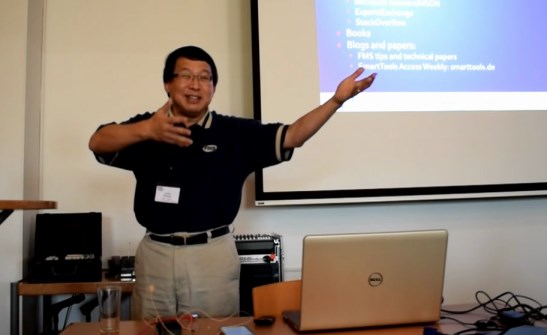
Equally important was his advice on good coding practice and indicators for potential developer errors in the code. Unused procedure parameters, events never raised, and leftover Stop-Statements are all indicators of unfinished development that likely will cause problems in your productive application. These and many more potential errors will be checked by FMS’ product Total Access Analyzer.
Of course particularly this sub-topic is very dear to me, as it is very closely related to my Better VBA video series and I can’t wait to try Total Access Analyzer myself.
While Luke’s selection of issues and the solutions to them was excellent, I had more than once the feeling that is presentation lacked a little bit of technical depth. Quite often he referred to the FMS website for an in depth description of the issues discussed and their solution.
There is nothing wrong with referring to further information on particular topics, neither is there with promoting a product that solves the issue at hand. Still, I would have liked some more detailed information there and then.
Nevertheless, this was a highly entertaining presentation, it covered lots of important issues and challenges and provided valuable clues to their solution. I thoroughly enjoyed this talk.
Peter Bryant - Communicating with JSON Services Natively in Access VBA
In our age of distributed (REST) services, the JSON data format is gaining more importance by the day. Other than for XML there is no component deployed with the Windows Operation System to handle JSON data.
That makes compelling case for writing code to handle JSON directly in VBA. Peter Bryant presented his VBA implementation to handle JSON data without any external components in Access/VBA.
Peter began his presentation with a general introduction to JSON, examples of JSON data, the JSON Spec, and some samples of Endpoints before he moved on to showing his example implementation.
Many of his code examples used Troy Hunt’s ';--have i been pwned?-website as an endpoint to retrieve JSON data from. This was quite a good choice of a sample project, as probably everyone in the audience could relate to its topic and its data structures were fairly simple and comprehensible.
Peter’s presentation covered lots of technical details of the HTTP-Protocol and JSOSN. A very valuable tool he demonstrated was the Postman App for testing web APIs.
I really enjoyed Peter’s presentation, which was very clear, calm, and sprinkled with a good dose of British understatement. On the downside, there is no denying it was very code heavy and could have benefitted from an additional perspective somewhat more detached from implementation details.
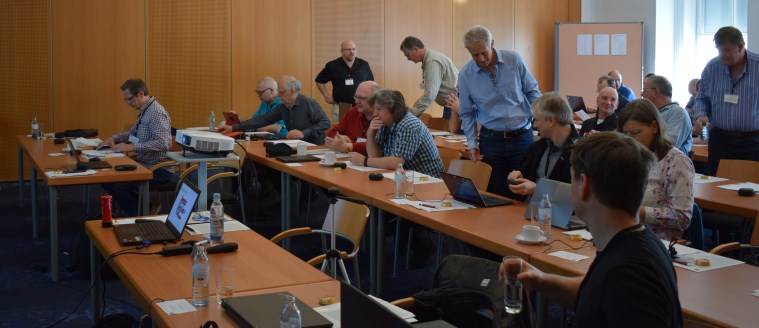
Anders Ebro - Techniques+Tricks for Access Pros
Anders Ebro, TheSmileyCoder from Denmark, prepared several different topics for us. He showed us parts of several real world applications he worked on recently.
He started by showing an Application for documenting construction sites mainly with pictures. Picture handling in Access was significantly improved in the last couple of versions. Nevertheless, for the specific requirement of managing thousands of sizeable pictures in a distributed environment there is actually very little in-built support in Access. So the thumbnail generation, and picture caching mechanisms he demonstrated are helpful and impressive alike.
The second part of his presentation was an assorted compilation of classes. A Stopwatch, an extended ComboBox and extensions to or combinations of several other Access controls show convincingly that, while VBA is rather an object based than real object oriented language, it is still possible to use classes and objects to create more maintainable and sophisticated applications with it.
The final part of his presentation was once again about the creative use of Access controls to overcome the limitations of the more obvious default solutions. This time the focus was on (Sub-)Reports inside forms.
The use case for Anders’ pretty notes sample should be quite frequent. Still, only very few people in the audience raised their hands when asked if they used sub-reports in forms before. I was aware of this possibility, but haven’t thought of this particular use case before. - But I will definitely try to implement this, as I’ve got a client project suffering exactly from the problems Anders solved with this approach.
This presentation was the most understated on the agenda, as its title was rather bland. But after watching it, I think it was one of the most valuable of the whole conference. Particularly the part about classes demonstrated a technique that can be employed in almost any project, but it probably totally underused by the average Access developer.
Paul Rohorzka - Automated Testing in Access Applications
Automated testing is a topic that has taken a significant role in most of the software industry in recent years. Not so with Access development. Paul is a long-time advocate of automated testing. So he is in this topic with heart and soul.
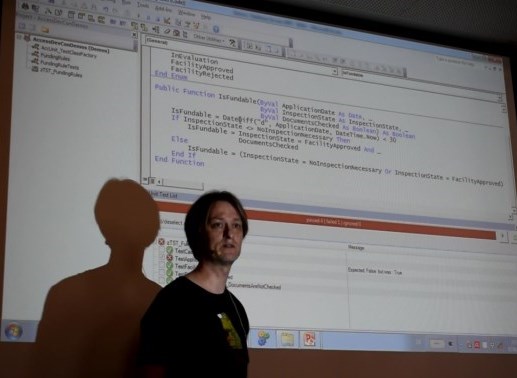
He introduced the audience to this topic by pointing out the benefits of automatic testing. Next he showed the basic course of action to implement some basic unit tests before he presented AccUnit-Testing-Framework for Access/VBA as one potential tool to implement unit testing with.
While showing in his slides that automated testing is much more than just unit tests, Paul focused on unit tests because they are directly linked to the development process and they are the most cost efficient tests to implement.
He showed how to write unit tests for VBA, how to go one step further to test driven development (TDD) and all this with practical examples and approaches.
Still, from own experience, I know how hard it is to implement automated testing in Access development projects. I would have liked to get even more detailed information on that. Nevertheless, this was a talk that really inspired me to give my own efforts to implement automatic tests another push.
Automated testing with Access is hard, and I dearly needed this inspiration. Another extremely useful presentation for me.
American vs. European presentation style
This was the first time I had the opportunity to enjoy some experienced speakers from the United States. With all of the presentations a very noticeable difference between the “American” and the “European” presentation style became apparent.
While the Americans focused much on the entertainment value of their presentation and were somewhat liberal with technical detail and accuracy, the Europeans did primarily technical presentations that provided much more detailed information, but were also quite a bit dry.
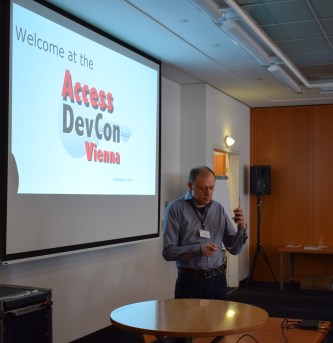
Which style do I like better? Depends! For a broad overview over a given topic I would most likely prefer the American style due to its entertainment value. But when I would be looking for in-depth expert knowledge and guidance on any particular topic, the Europeans win hands down.
For this Access DevCon conference the mix of both styles was a huge gain, as it provided a much broader variety in the presentations that I’m used to. Karl did an excellent job choosing the presenters of this conference.
Wrap up
I really enjoyed meeting the all those very friendly and nice people from different countries and continents. This added quite an interesting twist to the conference that I haven’t experienced before at any other conference.
In my opinion this international Access developer conference was a huge success and I hope there will be more issues of Access DevCon in the years to come.
I will never share your email with anyone. You can unsubscribe any time.
This email list is hosted at Mailchimp in the United States. See our privacy policy for further details.
© 1999 - 2024 by Philipp Stiefel - Privacy Policiy



